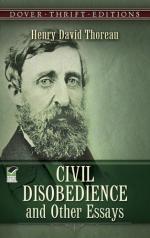
|
| Name: _________________________ | Period: ___________________ |
This test consists of 15 multiple choice questions and 5 short answer questions.
Multiple Choice Questions
1. What kind of issue did Thoreau say slavery was?
(a) All of these.
(b) Political.
(c) Spiritual.
(d) Moral.
2. Why does Thoreau blame the citizens of his state for slavery?
(a) They are not paying attention.
(b) They are prideful.
(c) They signed slavery into law.
(d) They are too complacent.
3. What did Thoreau say most media devices were striving to do?
(a) Appease the masses.
(b) Reflect the truth.
(c) Make money.
(d) Gain approval.
4. How did Thoreau say med should treat the government when acting immorally in 'Slavery in Massachusetts'?
(a) With compassion.
(b) With contempt.
(c) With obedience.
(d) With logic.
5. What does Thoreau say should be used to make important decisions in 'Civil Disobedience'?
(a) Research.
(b) Logic.
(c) Conscience.
(d) Mercy.
6. What attribute does Thoreau say all men should have naturally in 'Slavery in Massachusetts'?
(a) Choice.
(b) Respect.
(c) Intelligence.
(d) Freedom.
7. In 'Civil Disobedience', what does Thoreau say a just man will not wait for?
(a) A majority.
(b) A favorable choice.
(c) A leader.
(d) An opportunity.
8. Who was very friendly to Thoreau when he took his own advice in 'Civil Disobedience'?
(a) His incumbents.
(b) His neighbors.
(c) His family.
(d) His cell mate.
9. What role does Thoreau challenge in 'Civil Disobedience'?
(a) The immigrants.
(b) The slaves.
(c) The citizens.
(d) The government.
10. What did Thoreau say made men innocent in 'Slavery in Massachusetts'?
(a) Following the law.
(b) Appeasing the officials.
(c) Being educated.
(d) Doing what is right.
11. What is the main theme of 'Civil Disobedience'?
(a) Religion in politics.
(b) Moral responsibility.
(c) Appropriate places to disobey.
(d) The role of politics.
12. What does Thoreau say soldiers are expected to do?
(a) Carry out the will of government.
(b) Serve.
(c) Defeat opposition.
(d) Obey.
13. Why was Thoreau so unimpressed with the governor of his state?
(a) He did not enforce slave laws.
(b) He gave in to money lenders.
(c) He had never given a strong speech.
(d) He was soft about his voting.
14. What part of man does Thoreau say government has control over?
(a) The mental part.
(b) The religious part.
(c) The emotional part.
(d) The physical part.
15. Who does Thoreau say should provide what government needs for them to have authority?
(a) Government officials.
(b) The needs of the country.
(c) The American citizens.
(d) Their conscience.
Short Answer Questions
1. What part of man does Thoreau say government can NEVER manipulate?
2. What is used to restore order when people try to free Burns?
3. Why was Thoreau put in jail?
4. What did Thoreau say the issue of slavery was doing to his state?
5. What did Thoreau describe as very clean in 'Civil Disobedience'?
|
This section contains 448 words (approx. 2 pages at 300 words per page) |

|




